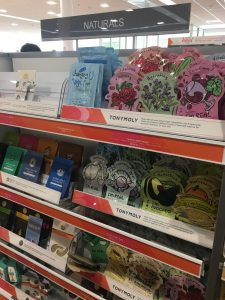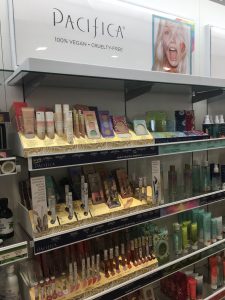Every day beauty-industry products such as shampoos, lotions and deodorants can have harmful ingredients in them such as formaldehyde and phthalates. They can be toxic and cause serious health problems. Many people are now turning to brands with natural ingredients as awareness rises.
According to Natural Society, an advocate for health product information, there are several ingredients in everyday items that are harmful. One of them is Sodium Lauryl Sulfate, which penetrates the skin and leaves residue in the heart, liver, lungs and brain. Another ingredient is Parabens, which is linked to reproductive damage and organ toxicity. Polyethylene Glycol can interfere with human development and cause systemic toxicity if used on broken skin.
Alternatives to these toxic chemicals are now on the shelf. Many stores such as Ulta Beauty Inc. and Sephora USA Inc. carry products with healthy ingredients like coconut and argan oils in addition to honey and aloe vera.
College of Southern Nevada student Alyssa Devera says, “I prefer natural ingredients because I find that it makes my skin feel soft and nice. I don’t mind if the product is American or not as long as it is safe and of good quality.”
Devera also says it’s good to do look into products by checking the fact label on the back of the package. “I always research before buying a product. I make sure there are no bad alcohols in it. I usually pick products depending on how well the ingredients work on my skin.”
CSN chemistry Professor Amanda Hudson says, “With the wealth of information available today, consumers now have the opportunity to look up any and all of the chemicals listed in the products they use and to read the associated hazards by searching for the Safety Data Sheet for that product. This can help consumers make informed decisions on what is right for them as the safety sheets include human health concerns for the substances.”
According to a May 2017 article titled “What’s Driving the Billion-Dollar Natural Beauty Movement?” in the magazine Fast Company & Inc., the natural beauty market’s value is expected to reach $13.2 billion by 2018. “Brands with natural and or botanically-derived clinical orientation now represent the largest combined share of prestige skin-care sales.”
CSN student Genesis Cruz says, “I do use other things that aren’t natural ingredients but I prefer to use coconut oil because it makes my hair feel free and I tend to have more volume in it.”
Kaimara Hatcher, CSN student, says, “There are a lot of products that claim to be ‘natural’ from big brands but they still have chemicals in it. In turn, the products that are marketed as ‘all natural’ can be quite pricey. That is why I usually use simple things on their own like pure oils, essential oils, raw shea butter, apple cider vinegar, witch hazel, activated charcoal, aloe vera gel, or I will make my own products from stuff like that.”
“If you or your family has sensitivities there is quite a bit to be said for using products free of dyes and perfumes or making your own products,” Hudson says. “You can make your own soaps, detergents, lip balm, etc. and eliminate anything that you know to be an allergen. People have allergies to products that are labeled ‘natural’ as well, like baking soda, so just be aware of that risk.”
“People often think that natural means simple or untested but natural ingredients are actually some of the most powerful ingredients in the world,” according to the article in Fast Company noted above. “The organic beauty boom is part of the larger shift in consumer awareness about health and wellness.”





